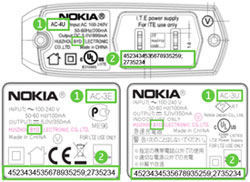After a flaw was uncovered in some of its handset chargers that could expose consumers to a shock hazard, Finnish mobile giant Nokia (NYSE: NOK) on Monday announced a recall program t hrough which it is offering a free exchange.
hrough which it is offering a free exchange.
The problem affects a limited number of chargers of certain model types manufactured by Chinese third-party supplier BYD Electronic, Nokia said. Specifically, the affected models are the AC-3E and AC-3U models, manufactured between June 15 and Aug. 9 of this year, and the AC-4U model, manufactured between April 13 and Oct. 25, 2009.
Affected chargers may have been sold with a Nokia device or purchased separately as an accessory.
Nokia is not aware of any incidents or injuries related to the affected chargers, but is offering the free exchange as a precautionary measure, it said. It has set up a Web site to facilitate exchanges on a country-by-country level.
Problematic Plastic Cover
The problem was discovered during a routine quality control process, Nokia said.
Specifically, in the affected chargers, it was determined that a plastic cover could come loose and separate, exposing the charger's internal components. That, in turn, could pose an electrical shock hazard if the consumer were to touch certain internal components while the charger is plugged into a live socket.
The number of chargers affected may be as high as 14 million, according to media reports. Nokia did not respond by press time to TechNewsWorld's request for comment.
The company's stock was up 2.73 percent to US$13.58 in midday trading on Monday.
'A Good Reputation'
"In the consumer marketplace there are millions of devices, old and new," wireless and telecom analyst Jeff Kagan told TechNewsWorld. "Occasionally, there will be a problem with one."
Nokia has a good reputation, Kagan added. "I am glad they found the problem and are correcting it before customers get hurt and it becomes a problem," he said.
In fact, the charger recall is not Nokia's first encounter with such a problem. Back in 2007, the company recalled 46 million batteries because of their potential to overheat.
Nokia Recalls Potentially Hazardous Chargers
Friday, November 20, 2009
Labels:
Nokia Recalls
Posted by
Technology
at
12:09 AM
![]()
Subscribe to:
Post Comments (Atom)


0 comments:
Post a Comment
Note: Only a member of this blog may post a comment.